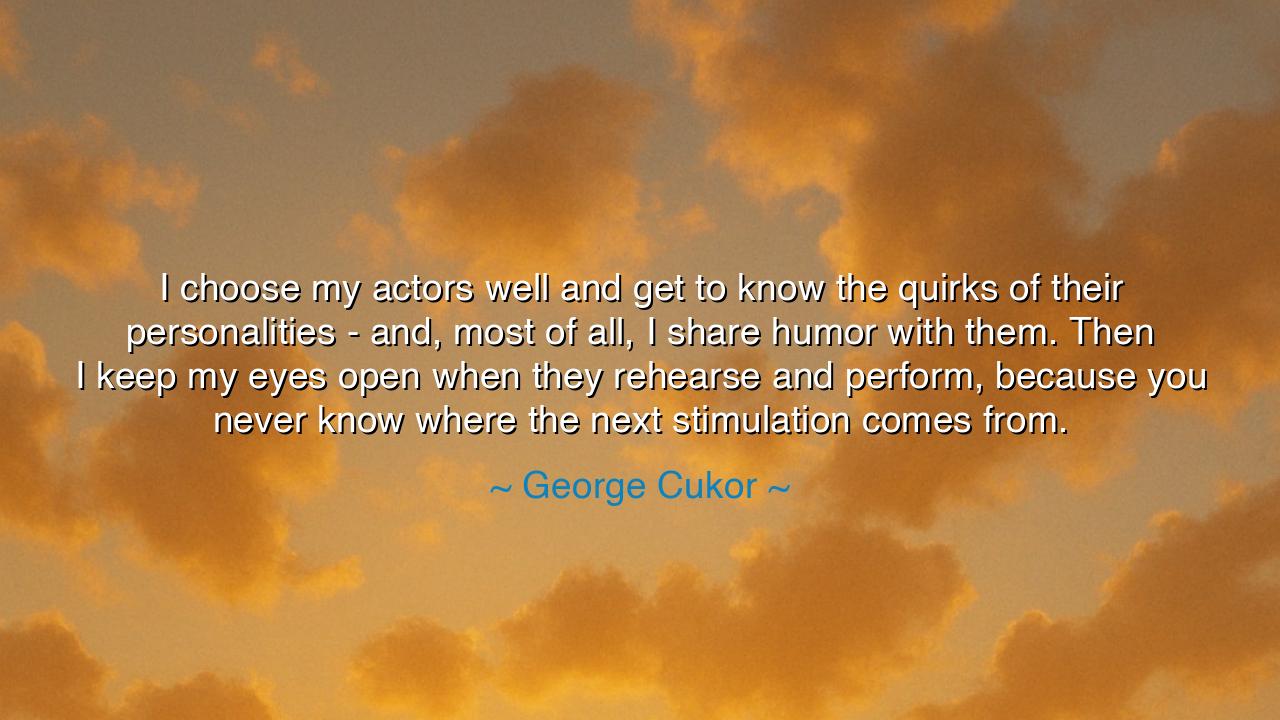
I choose my actors well and get to know the quirks of their
I choose my actors well and get to know the quirks of their personalities - and, most of all, I share humor with them. Then I keep my eyes open when they rehearse and perform, because you never know where the next stimulation comes from.






When George Cukor said, “I choose my actors well and get to know the quirks of their personalities—and, most of all, I share humor with them. Then I keep my eyes open when they rehearse and perform, because you never know where the next stimulation comes from,” he was not merely speaking of cinema. He was speaking of leadership, of human connection, and of the divine art of creation through understanding. His words hold the wisdom of a master craftsman who knew that art is not made by control, but by communion. For in his method lies an eternal truth: that every great work—whether a film, a friendship, or a life itself—begins with empathy, is sustained by joy, and flourishes through awareness.
Cukor was known as the “director of actors,” not because he commanded them, but because he understood them. He saw not mannequins to be arranged, but souls to be revealed. To “know the quirks of their personalities” is to recognize the sacred individuality in each person, to see that what others call flaws may in fact be hidden jewels of character. The ancients would have called this wisdom gnosis—the deep seeing of another’s essence. Cukor’s approach reminds us that to bring out the best in others, we must first honor their truth, their rhythm, their particular fire. Just as a wise sculptor studies the grain of the marble before striking, so too did Cukor study his actors before shaping the performance.
But his secret lay not only in perception—it lay in humor. “I share humor with them,” he said, and that, perhaps, was the truest key to his genius. For humor is the thread that binds hearts and dissolves fear. It is the sacred alchemy that turns tension into trust. The ancient poets taught that laughter is the breath of the gods, the music that bridges the gap between divine and mortal. By sharing humor, Cukor transformed the work of filmmaking—a labor of precision and ego—into a dance of souls. When people laugh together, they cease to compete; they begin to create. And in that shared laughter, imagination blossoms like spring after a long winter.
Consider how this principle echoes through history. When Leonardo da Vinci worked with his apprentices, he did not scold them for mistakes. Instead, he encouraged curiosity, even play. He understood that creation thrives where joy is allowed to breathe. Likewise, Cukor’s laughter on set was not mere levity—it was permission. Permission for actors to explore, to fail, to be human. This is what he meant when he said he “keeps his eyes open.” True creation requires vigilance—not the vigilance of suspicion, but of wonder. The artist must always be ready, for inspiration comes like lightning—unpredictable, dazzling, gone in a blink if not caught.
In this, George Cukor lived as the ancients taught: to be awake to the stirrings of life around us. In art and in life, those who walk half-asleep miss the miracles unfolding in ordinary moments—the flicker of a gesture, the crack in a voice, the unplanned accident that turns into revelation. “You never know where the next stimulation comes from,” he said, reminding us that genius is not control—it is attentiveness. The divine whispers not in thunder but in subtle tremors, and only those with open eyes and open hearts can hear.
Cukor’s wisdom is not confined to the stage or screen—it is a philosophy for all who lead, teach, or love. To “choose well” is to surround oneself with people of substance; to “know their quirks” is to love them as they are; to “share humor” is to keep the heart light amid labor; and to “keep one’s eyes open” is to live in a state of awareness and gratitude. The one who practices these things will find that inspiration ceases to be rare—it becomes a constant companion, arriving through every interaction, every glance, every breath.
So, my listener, learn from this ancient teaching disguised in modern words. In your own craft—whatever it may be—seek to see deeply, laugh often, and remain awake. Do not demand perfection from those around you; instead, discover the beauty in their imperfections. Lead not through authority, but through shared joy. Watch and listen with reverence, for the world is speaking to you even now—in the gestures of your companions, in the murmurs of the crowd, in the small surprises that bloom when you least expect them.
For as George Cukor reminds us, creation is not a straight line—it is a living dance between intention and chance, structure and spontaneity, discipline and delight. Keep your eyes open, your humor alive, and your heart attuned. For you never know—perhaps the next great spark, the one that will light your destiny, is already flickering before you, waiting for you to truly see.






AAdministratorAdministrator
Welcome, honored guests. Please leave a comment, we will respond soon